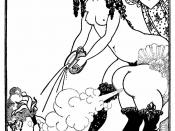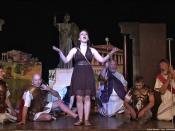Women and Men in Lysistrata and the Role of Sex and Reason Aristophanes' Lysistrata is an excellent example of satirical drama in a relatively fantastical comedy. He proceeds to show the absurdity of the Peloponnesian War by staging a battle of the sexes in front of the Acropolis, worshipping place of Athena. Tied into all of this is the role of sex and reason and is evident in the development of some characters and the lack of development in others. Although the play is centered on Lysistrata, the story is truly propelled by the ideas of sex and reason.
The dialogue of Lysistrata is filled with double meaning, and most every character takes the sexual meaning. During the oath, the flash of wine symbolizes the male sex organ, and the black bowl the female genitalia. Dionysus, as god of both fertility and wine, functions here in both aspects. The action of pouring wine into the bowl signifies the ejaculation of sperm into the womb and contrasts with the sterility of the oath.
Their oath promises them to not enjoy intercourse. The burning torches brought by the men's chorus are an ironic symbol of the passions raging in men's loins. Their attempt to batter through the gate is nothing else than a sexual penetration, and foreshadows the attempts of Cinesias later in the play.
Within Lysistrata, the pouring of water on the men to douse their sexual urges parallels the dampening of their husbands' passions to which the women have sworn. The Magistrate's allusions refer to the lustful invitations to adultery, which men offer. Amongst all this passion is Lysistrata, and in response to the Magistrate's call for a crow-bar (another phallic symbol), she states, "We don't need crowbars here. / What we need is good common-sense" (546-47).


